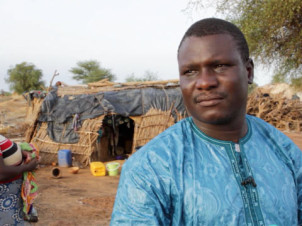
By Nick Meynen.
In the shadow of French President Hollande’s West-Africa Tour, dissenting views on extraction and environmental justice were silenced. In Niger, ten members of the Network of organizations for Transparency and Budget Analysis (ROTAB) and Publish What You Pay (PWYP) Niger, including coordinator Ali Idrissa, were arrested after a press conference where he had called on AREVA to respect Niger’s laws and where he denounced aspects of the France – Niger relationship as neo-colonial.
ROTAB and PWYP Niger have long campaigned on issues of extractive transparency and natural resources. Ali Idrissa is also on the International Board of the EITI (Extractive Transparency Industry Initiative). Most recently, he led a campaign to ensure that Niger got a fair deal for its uranium in the country’s renegotiation of their contract with AREVA. He was named man of the year in Niger 2013 and among Africa’s most 100 influential people. Niger is an EITI implementing country and had enshrined the principle of the transparency of its natural resources in its 2010 constitution. The activists from Nigerien civil society were freed on Friday evening 18 July 2014, but are due to appear before a judge this week. PWYP is very concerned by the deteriorating situation for civil society activists in Niger.
These events are another illustration of the dangers of a process described by EJOLT’s Marta Conde, in her latest article for Ecological Economics: Activism Mobilising Science (AMS). Marta’s article sheds light on a process where unequal power relations regarding knowledge of environmental and health risks are contested through the co-production of scientific and local knowledge. She argues that lay citizens, communities and local grassroots organisations immersed in socio-environmental conflicts are engaging with professional scientists to understand the impacts a polluting project is causing to their environment and themselves. Together with scientists they co-produce new and alternative knowledge that gives the local organisations visibility and legitimacy, information on how to protect themselves from the impacts, and allows them to engage in practical activism, challenging the manufactured uncertainty and other information produced by the state or companies running the projects. And yes, her analysis is based on two uranium mining conflicts in Niger and Namibia where two local organisations are trying to confront the manufactured uncertainty of the nuclear industry through an AMS process. In Niger and in Namibia local activists mobilized CRIIRAD (www.criirad.org) to get instructed on radiation risks.
What this story also illustrates is the need to protect environmental whistleblowers. Regimes from resource rich countries are often more sensitive to bad press abroad (such as here, in The Guardian) than bad press at home – especially because the local press is often already (self-)censored. Ali Idrissa and the ten other activists from PWYP were released after their international network published on the arrests and placed pressure on the regime – giving them the message that they won’t get away easily when silencing civil society. So what we need is courageous local whistleblowers, Activism Mobilising Science and international networks like EJOLT and many others to provide a global outreach and protection. The good news is that we see this convergence happening on the ground in many corners of the world. Or in the words of a mainstream journal in India, reporting on EJOLT: “Those who manufacture spin about protests … would need to take note. Human rights scrutiny of business is increasing. Deal with it”.

The project ENVJUSTICE has received funding from the European Research Council (ERC) under the European Union’s Horizon 2020 research and innovation programme (grant agreement No. 695446)